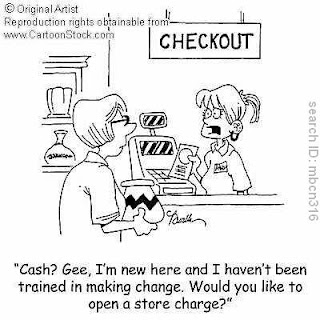Have you ever been at the checkout point of a store when all of a sudden the computers crash? The eyes of all cashiers immediately bulge as they begin to frantically look around at each other. The customers in the line behind you let out an audible groan as they realize more time has been added onto their wait in the line. And usually all sales come to a halt, because how can anyone possibly complete a checkout without the use of the computerized register? Back in the old days, cash and checks were the main forms of payment. I even remember when my mother would write out checks at the grocery store and it was considered "normal". Now, check cards are all the rage, and if you don't have any money handy in the bank, then credit cards are your plastic savior. Yet despite advancements in technology both in form of payment and in registers that receive the payment, there seems to be the glitch of when computers freeze and registers just stop working. Computers can crash anytime, leaving cashiers vulnerable to the impatience of difficult customers and leaving customers with an uncertain time period of waiting. There's no doubt that cash registers are a convenience that is essential to any business. But should there be some other form of back up for when the register computers crash or freeze up, or is it okay to be fully dependent on this piece of technology?
A similar scenario is brought up in an article I found in the Journal of Leadership Studies, which I was able to access through the Wiley InterScience Database thanks to the FSU Library page. In the article, the author relays an experience in which a power outage brought business to a complete halt, stating: "not because of anything hindering the physical exchange of goods...but because...without an electronic calculator, no one in the store knew how to make change" (Miller 74). The article discusses the dependence we have on technology and the fact that institutions of higher education continue training students to rely more on technology, rather than encouraging students to think critically and with a "greater emphasis on intentional development of technology-independent thinking skills." (Miller 74).
If you're interested in reading more about the topic, Miller's article is worth a read!
--
Miller, George P, and Caroline Molina-Ray. "Beyond Technology Dependence." Journal of Leadership Studies4.1 (2010): 74-77. Web. 8 Jul 2010.




